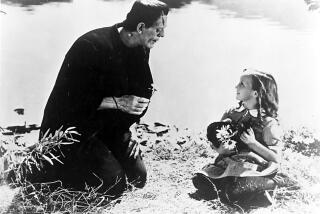He’ll Baby Her and Thumbs Down to Finger-Waggers
Derrick Poole is bringing up baby, just the way the child’s mother had asked in her last words to him. When 1-year-old Michele Poole was born by Caesarean section on July 30, 1986, her mother had been brain-dead for 53 days, after lapsing into a coma because of a brain tumor. The mother, Marie Odette Henderson, had been kept on life-support machines by a court order obtained by Poole, giving Michele critical time to grow. Poole also got parental status, although he and Henderson were not married. “This baby was something that me and Odette both wanted. We talked about it many times,” Poole said. “Her last words to me were: ‘Take care of baby.’ That’s what I am doing.” Now, Michele is a healthy, teething toddler with a proud father. They share a home in the Oakland hills with a friend of Henderson, Michele Germany, and her 2-year-old son. “For a while, I looked away as I held her,” said Poole, 32. “Now I’m just grateful that a part of Odette is alive. She’s a talker. Her mother was a talker. She’s got her mother’s eyes. . . . She is spoiled rotten by me. They tell me every day at day care that I must not let her suck her thumb. I tell them she can suck her thumb any time she wants, and I’ll pay the dental bills.”
--Chris Saricks says his last chapter of a chain novel is also the last of his writing career. The Chicago geographer beat more than 400 entries in a National Public Radio contest to finish a story penned piecemeal by 24 nationally known authors. Today, NPR’s “Weekend Edition” will carry his final chapter in the tongue-in-cheek tale of Fiona McKenzie, a fictional former Miss Mississippi and right-wing fundamentalist targeted for assassination by feminists. Among the authors of “Seeing the Lite” were David Leavitt, Stanley Elkin, Lorrie Moore and George Plimpton. Leavitt, who wrote “The Lost Language of the Cranes,” began the tale, introducing its odd characters. In later parts, McKenzie’s husband is abducted during a test drive, characters are killed, she meets God and calls People magazine. Richard Bausch, author of “The Last Good Time,” wrote a chapter and judged the contest. “The idea was to get the next guy in as much trouble as we could, which is why very soon the novel lost any sense of traditional reality,” Bausch said. Saricks, 39, pokes fun at government, fundamentalist preaching and commercial TV. “This was just something to do in fun and whimsy,” he said. “. . . This was a one-shot deal.”
--Two World War II Army privates, separated after being wounded by the same bullet, were reunited after 42 years. Harry Goedde and Ernest Mogor were stationed on the Rhine River in Germany in April, 1945. As Mogor came to relieve Goedde on watch, a German sniper fired a bullet that went through Goedde’s legs, into Mogor’s groin and fragmented. Goedde found his old friend by putting an advertisement in Disabled American Veterans magazine, which resulted in a newspaper story. Mogor gave the part of the bullet doctors were able to remove to Goedde. “I had it for the first 40 years. He can have it for the next 40,” Mogor said.
More to Read
Sign up for our Book Club newsletter
Get the latest news, events and more from the Los Angeles Times Book Club, and help us get L.A. reading and talking.
You may occasionally receive promotional content from the Los Angeles Times.






